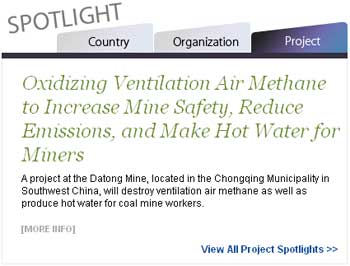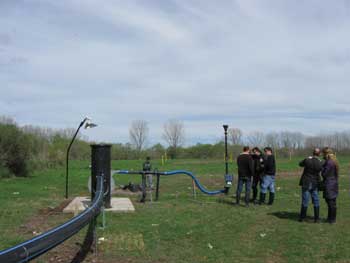Methane to Markets' Projects in the Spotlight
 Many methane
capture and use projects have gone from concept to reality in the short time Methane
to Markets has been operational. Now you can read all about them on the
Partnership's website. Highlighted at the 2010 Partnership
Expo, these project spotlights include agriculture, coal mines, and
landfill projects from Brazil,
China, India, and
Ukraine. All have been completed and are helping to reduce emissions
by more than 6 million metric tons of carbon dioxide equivalent annually. One of
the projects, the Datong mine project,
located in the Chongqing Municipality in Southwest China, will destroy ventilation
air methane (VAM) with methane oxidization technology. The heat generated during
oxidization will be used to produce hot water for coal mine workers. Another project,
Frigorífico Mabella, a nine-year-old
pork processing, swine production, and trading company in the Matto Grosso province
of Brazil, will be using biogas to provide electricity to the farm. Read more about
these and other exciting methane capture and use projects on the
Methane to Markets website.
Many methane
capture and use projects have gone from concept to reality in the short time Methane
to Markets has been operational. Now you can read all about them on the
Partnership's website. Highlighted at the 2010 Partnership
Expo, these project spotlights include agriculture, coal mines, and
landfill projects from Brazil,
China, India, and
Ukraine. All have been completed and are helping to reduce emissions
by more than 6 million metric tons of carbon dioxide equivalent annually. One of
the projects, the Datong mine project,
located in the Chongqing Municipality in Southwest China, will destroy ventilation
air methane (VAM) with methane oxidization technology. The heat generated during
oxidization will be used to produce hot water for coal mine workers. Another project,
Frigorífico Mabella, a nine-year-old
pork processing, swine production, and trading company in the Matto Grosso province
of Brazil, will be using biogas to provide electricity to the farm. Read more about
these and other exciting methane capture and use projects on the
Methane to Markets website.
Infrared Heater Project Operational
 Argentina's Solid Waste Association
(ARS)
Argentina's Solid Waste Association
(ARS)
 has been working for the past three years to develop a pilot-scale project that
recovers landfill gas (LFG) and uses it to fuel infrared heaters. In 2007, ARS received
a Methane to Markets grant for
$125,000 from the U.S. Environmental Protection Agency
has been working for the past three years to develop a pilot-scale project that
recovers landfill gas (LFG) and uses it to fuel infrared heaters. In 2007, ARS received
a Methane to Markets grant for
$125,000 from the U.S. Environmental Protection Agency
 to create a project that uses LFG to fulfill onsite energy needs. ARS selected the
Escobar Landfill in Buenos Aires, Argentina, to be the site of the project. Currently,
the Escobar Landfill has an operational LFG project where an infrared heater uses
15 standard cubic feet of LFG per minute to supply onsite energy needs. By substituting
LFG for a fossil fuel, ARS calculated that the net avoidance of greenhouse gas emissions
will be nearly 515 metric tons of carbon dioxide equivalent per year. In addition,
the project will yield local air quality improvements by reducing local greenhouse
gas emissions. When the heaters are not in use, the landfill will flare the LFG.
to create a project that uses LFG to fulfill onsite energy needs. ARS selected the
Escobar Landfill in Buenos Aires, Argentina, to be the site of the project. Currently,
the Escobar Landfill has an operational LFG project where an infrared heater uses
15 standard cubic feet of LFG per minute to supply onsite energy needs. By substituting
LFG for a fossil fuel, ARS calculated that the net avoidance of greenhouse gas emissions
will be nearly 515 metric tons of carbon dioxide equivalent per year. In addition,
the project will yield local air quality improvements by reducing local greenhouse
gas emissions. When the heaters are not in use, the landfill will flare the LFG.
Landfill Gas Workshop
On 2 June 2010, landfill owners and managers, government officials, project developers,
and project financiers will meet in Buenos Aires, Argentina, for a workshop on the
basics of LFG projects. Entitled "Creating Viable LFG-to-Energy Project in
Latin America," the workshop will provide an overview of the landfill sector,
explain LFG-to-energy systems, and review the basics of project planning. Speakers
will share strategies to bring a landfill online as well as insights into project
design and financing. Representatives from Methane to Markets Partner Countries
will present specific opportunities and project models for landfill methane capture
and use in Latin America, as well as financing and incentive programs. The workshop
will be held after the
International Solid Waste Association Beacon Conference
 ,
also being held in Buenos Aires.
More information and the
agenda (PDF, 2 pp., 159 KB) are available.
,
also being held in Buenos Aires.
More information and the
agenda (PDF, 2 pp., 159 KB) are available.
Recent Developments
Methane to Markets Included in New Draft Senate Climate Bill
On 12 May 2010, U.S. Senators John Kerry and Joe Lieberman released a draft of a
climate change and energy bill, entitled the
American Power Act (PDF, 987 pp., 1.7 MB)
 .
The bill would place emissions limits on approximately 7,500 U.S. factories and
power plants whose operations emit more than 25,000 tons of greenhouse gases each
year.
.
The bill would place emissions limits on approximately 7,500 U.S. factories and
power plants whose operations emit more than 25,000 tons of greenhouse gases each
year.
The bill includes methane collection from mines, landfills, and natural gas systems, as well as manure management and anaerobic digesters, in the initial list of eligible project types for domestic emission reduction offsets. The bill also recognizes the important work of the U.S. EPA and other U.S. government agencies to promote international methane reductions through such programs as the Methane to Markets Partnership.
- Mark Your Calendars for the Next Coal Subcommittee Meeting.
On 28 October 2010, the Coal Subcommittee
will meet in Beijing, China to discuss the next steps for the Subcommittee. The
Subcommittee meeting will be held in conjunction with the CCII Symposium, which
is being held on 26-27 October 2010.
- Oil and Gas Conference Held in the Middle East. In May 2010, regional
and global experts met at the Middle East
and North Africa Forum on Flaring Reduction and Gas Utilization
 in Muscat, Oman. The forum focused on specific challenges and opportunities to reduce
flaring in the Middle East and North Africa region.
in Muscat, Oman. The forum focused on specific challenges and opportunities to reduce
flaring in the Middle East and North Africa region.
- Methane Capture From Coal Mines in China. In May 2010, United States-based
power developer
AES Corporation announced plans to expand its business of capturing methane
 from China's coal mines, which could develop into a near $1 billion industry once
market incentives are established. AES plans to build up to 25 VAM projects by 2017.
AES' first VAM project is at the Datong Coal Mine in Chongqing municipality, which
was showcased (PDF,
3 pp., 1.5MB) at the 2010 Partnership Expo. The project, once fully operational,
will be one of the first commercially operating facilities of its kind in China.
AES' methane-capturing projects are registered with the United Nations to qualify
as Clean Development Mechanism projects encouraged under the Kyoto climate pact.
from China's coal mines, which could develop into a near $1 billion industry once
market incentives are established. AES plans to build up to 25 VAM projects by 2017.
AES' first VAM project is at the Datong Coal Mine in Chongqing municipality, which
was showcased (PDF,
3 pp., 1.5MB) at the 2010 Partnership Expo. The project, once fully operational,
will be one of the first commercially operating facilities of its kind in China.
AES' methane-capturing projects are registered with the United Nations to qualify
as Clean Development Mechanism projects encouraged under the Kyoto climate pact.
- 2010 Ministerial Points of Contact. One of the main discussion
topics at the Partnership
Steering Committee meeting in New Delhi was the upcoming ministerial meeting
to be held in conjunction with a pre-Ministerial meeting of the
UNFCCC Conference of Parties
 in late 2010. A critical element of that event will be a Ministerial Declaration,
emphasizing the importance of the Partnership in addressing the challenges of clean
energy and climate change and noting the significance of the revised Terms of Reference.
As part of its charge, the Steering Committee tasked Partners to appoint points
of contact (POCs) to work with Administrative
Support Group (ASG) and other Partners in the development of the Ministerial
Declaration and event planning. As decided at the Steering Committee Meeting, the
ASG—with the input of the Steering Committee members—will develop a
working draft to be shared with POCs from all Partners. If you have not already
done so, please provide designated POCs for your country or organization to the
ASG.
in late 2010. A critical element of that event will be a Ministerial Declaration,
emphasizing the importance of the Partnership in addressing the challenges of clean
energy and climate change and noting the significance of the revised Terms of Reference.
As part of its charge, the Steering Committee tasked Partners to appoint points
of contact (POCs) to work with Administrative
Support Group (ASG) and other Partners in the development of the Ministerial
Declaration and event planning. As decided at the Steering Committee Meeting, the
ASG—with the input of the Steering Committee members—will develop a
working draft to be shared with POCs from all Partners. If you have not already
done so, please provide designated POCs for your country or organization to the
ASG.
- Reminder: U.S. EPA Has Extended the Deadline for Submission of Proposals.
The U.S. EPA
 has extended the deadline to fund international projects and activities that advance
methane capture and use in support of the Methane to Markets Partnership. Applications
for this solicitation
has extended the deadline to fund international projects and activities that advance
methane capture and use in support of the Methane to Markets Partnership. Applications
for this solicitation
 are now due by 29 July 2010. The total estimated amount for this
competitive funding opportunity is up to $5 million. EPA expects to award up to
35 cooperative agreements through this announcement, at $100,000 to $750,000 per
award. The project period for awards resulting from this solicitation will begin
in January 2011 and may be up to three years long.
are now due by 29 July 2010. The total estimated amount for this
competitive funding opportunity is up to $5 million. EPA expects to award up to
35 cooperative agreements through this announcement, at $100,000 to $750,000 per
award. The project period for awards resulting from this solicitation will begin
in January 2011 and may be up to three years long.
- Survey Says: Attendees Find Value in Expo. Feedback on the recent
India Expo has been flowing in via the
2010 Partnership Expo survey
 ,
but the ASG wants to hear from you. Let them know what worked, what did not, and
what you would like to see at future events by taking the time to complete the short
online
survey
,
but the ASG wants to hear from you. Let them know what worked, what did not, and
what you would like to see at future events by taking the time to complete the short
online
survey
 if you have not already done so.
if you have not already done so.
Send in your announcement for our next issue. Also, visit the news and events page for information on past Methane to Markets gatherings.